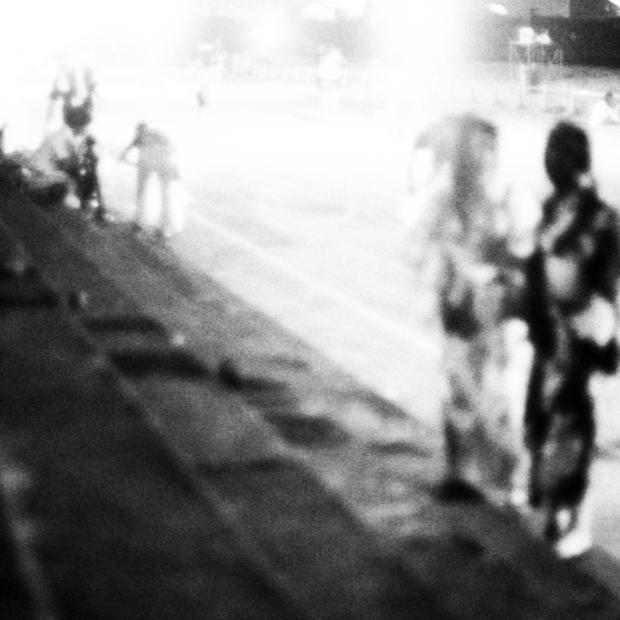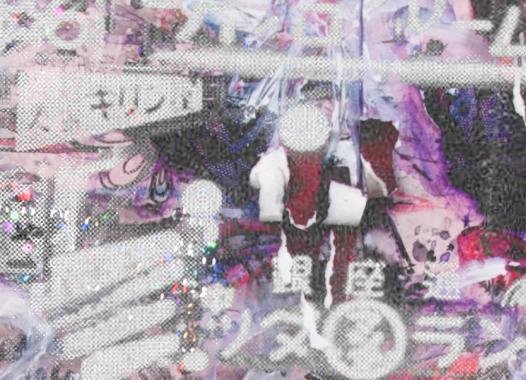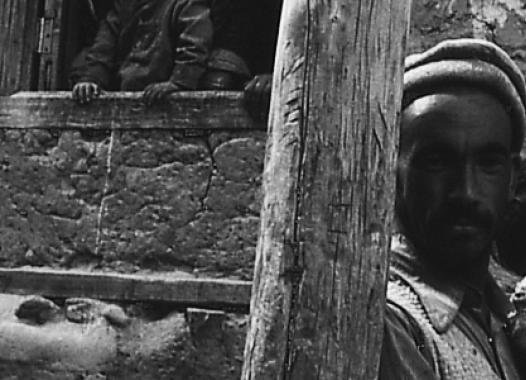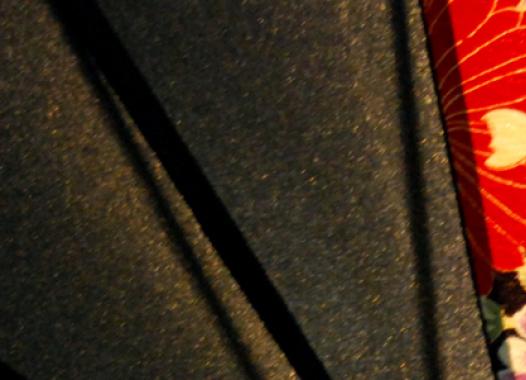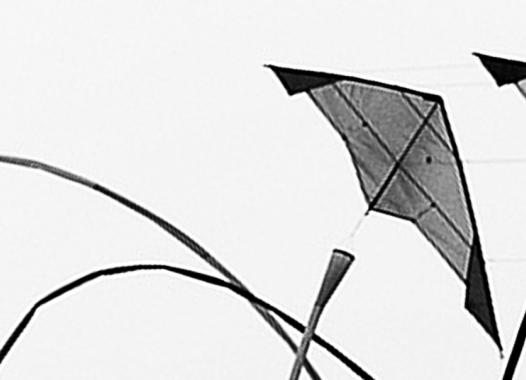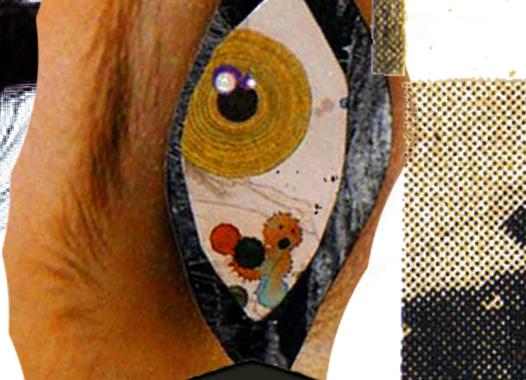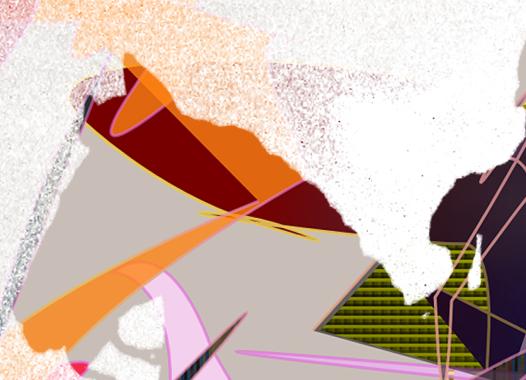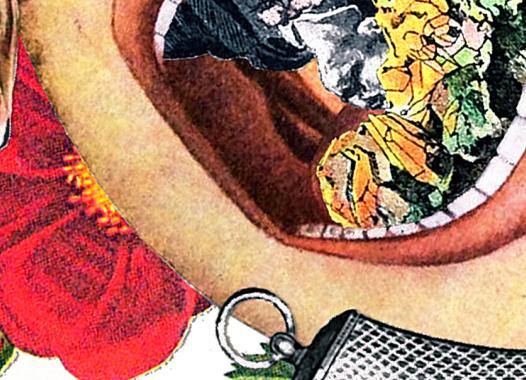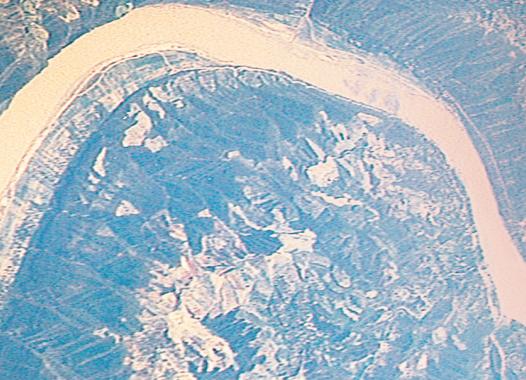

"How could I have come to the United States without Walt Whitman?"[1] writes the Indian American author Meena Alexander in 2004 in an essay that charts the meaning of the great US poet of the 19th century for her own work. As the essay's title indicates, the USA is for her "Whitman's Country." When Alexander grew up in Kerala in India, his Leaves of Grass were available not only in English but even in translation in her mother tongue, Malayalam.[2] Alexander emphasizes: "I could not have come to America without Walt Whitman."[3] As Whitman's "Passage to India" is his poem that most clearly and famously sketches US-Indian cross-cultural relations, it seems to suggest itself as privileged point of contact between herself and Whitman – but it is not. In the essays devoted to her debt to Whitman, she mentions other texts but refrains from addressing "Passage to India."
Alexander has indeed quoted from "Passage to India" once, in an epigraph for her poem "White Horseman Blues" in the collection The Shock of Arrival (1996). She used two lines from the ending of the first stanza and acknowledged her source: "'For what is the present, after all, but a growth out of the past? / (As a projectile formed, impell'd, passing a certain line, still keeps on …)' – Walt Whitman, "Passage to India."[4] Note that the quote does not concern Whitman's attitude towards India but his general belief in the determination of the present by the past. Accordingly, the following surreal five-part poem by Alexander picks up the idea of history's importance but complicates it. She highlights the underlying violence in imagining the past as "projectile" and evokes an immigrant Indian speaker. The poem starts in an office with the speaker at a copy machine where she is suddenly haunted by a ghostly presence that turns out to be the "White Horseman" of (neo-)colonialism. Through the next four parts of the poem she re-lives scenes of colonialism and migration when the horseman "races" more or less intact through English and American history before he (might have) "tossed his head into the East River"[5] in the last part. Not only is the direction of Whitman's "passage" reversed in the speaker's approaching "Manhattan island" and crossing "Brooklyn Bridge … on bare feet" in Part Three, but Whitman's romantic concept of organic "growth" and telic "passing" of the past into the present is thoroughly subverted. As Anupama Jain observes in her reading of the piece, it "reimagine[s] histories of colonialism and immigration from a contemporary South Asian American perspective."[6] Yet in its reconceptualization of "the past" as haunting, oppressive, and painful, the poem does not really "remin[d] us that the great American poet Whitman was a devout believer in multicultural America,"[7] as Jain claims but it is, in fact, a serious readjustment of Whitman's ideas of India and American history. It is less the continuation of "a dialogue begun by Whitman in the previous century"[8] than a rebuke, as "Passage to India" encapsulates exactly the ghost of the "White Horseman" that Alexander tried to exorcize in the poem.
In order to substantiate this reading, I start my essay by a closer look at "Passage to India." I then proceed to some ideas Alexander does borrow from Whitman's texts, and I finish with a reading of further texts that respond to and re-make Whitman's poetic tradition, in particular a long poem that I read as an answer to "Passage to India," without pretending that she had taken it as an intertext.
To put it in the more theoretical terms of Transnational Studies, my aim in this paper is to analyze how Whitman und Alexander construct the transnational in poetry by producing and reproducing, centering and decentering, stressing and transcending, covering up and highlighting the national. I will show how Whitman and Alexander establish and re-configure national and transnational poetic discourses. I will investigate how Alexander starts from the conceptual and formal openings established by Whitman and how she then proceeds to create a genuinely different kind of transnational Indian-American poetic space from what the nineteenth-century poet had and could have envisioned.
Walt Whitman: "Passage to India"
American literary interest in India started with the consolidation of US literature as national literature in nineteenth-century romanticism. Whitman's "Passage to India" was – like many of his texts – inspired by a multiplicity of sources. It is a hymn on human ingenuity and human progress. Astonishing technical development is greeted as preparing and enabling spiritual perfection. In the first verses of the poem, Whitman's poetical alter ego, his signature all-knowing, all-seeing speaker, invokes the past:
Singing my days,
Singing the great achievements of the present,
Singing the strong light works of engineers,
Our modern wonders, (the antique ponderous Seven outvied,)
In the Old World the east the Suez canal,
The New by its mighty railroad spann'd,
The seas inlaid with eloquent wires;
Yet first to sound, and ever sound, the cry with thee O soul,
The Past! The Past! The Past!
The Past – the dark unfathom'd retrospect!
…
For what is the present after all but a growth out of the past?
…[9]
Whitman starts from the latest news about the successful completion of spectacular large-scale projects – the opening of the Suez Canal (l. 5) and the completion of the First Transcontinental Railroad in 1869 (l. 6) as well as the successful installation of a transatlantic cable beneath the ocean in 1866 (l. 7). These brand-new technical wonders, first, signify contemporary reality in America and beyond, second, provide dynamic and trans-national symbols for progress and modernity, and, third, supply the basis for his metaphorical links through time ("The Past" ll. 9, 10) and space (from "the Old World" to "The New," ll. 5-6).
Beginning with the second part, the poem is based on the central topos of the soul's journey over oceans. It exists in Western as well as in Eastern cultures – in Shakespeare, Shelley, Cowper, but also in the Indian Baghavad Gita.[10] It is India that becomes the major reference point for "The Past! the Past! the Past!" (l. 9) in the poem:
Passage O soul to India!
Eclaircise the myths Asiatic, the primitive fables.
Not you alone proud truth of the world
Nor you alone ye facts of modern science,
But myths and fables of eld, Asia's, Africa's fables,
The far-darting beams of the spirit, the unloos'd dreams,
The deep diving bibles and legends,
The daring plots of the poets, the elder religions,
…
You too I welcome and fully the same as the rest!
You too with joy I sing.[11]
While the first part of the poem jumps from "present" (l. 2) to "Past" (ll. 9, 10), "Old World the east" (l.5) to "The New" (l. 6 ) the second part sets "truths of the world" and "facts of modern science" (ll. 18-19) against "myths and fables of eld, Asia's, Africa's" and "far-darting beams of the spirit, the unloos'd dreams" (20-21). Thereby it slides swiftly between Modern/Science and Asian/Antiquity, between Euro-North-American contemporary and Asian or African past spaces.
Later in the text, Christopher Columbus[12] becomes the key to the past that is conjured up for the present. The ending of Part Four makes Whitman's America the fulfillment of Columbus's dream:
(Ah Genoese thy dream! thy dream!
Centuries after thou art laid in thy grave,
The shore thou foundest verifies thy dream.)[13]
It is exactly Columbus's confusion of North America and India, his geographical mistake – that here supports the intended linkage of Whitman's "New World" (the American nation) to the mythic "India." The shore that Columbus "foundest" then is "verifie[d]" in the US nation today. The two become one, united in the glorious "project of modernity" (Habermas's term) which was initiated by men like Columbus. Their promise of modernity is fulfilled in the USA, whose representative and speaker Whitman becomes in "Passage to India."
The visionary relationship between the fifteenth-century conqueror and the nineteenth-century poet is strengthened by Whitman's speaker in the role of the poeta vates. Moreover, the passage between the worlds, or rather the collapsing of two "sub"-continents in Columbus's American-Indian Dream is formally expressed through the long sentences that strive beyond the verses' ends as Columbus strove and Whitman strives to span vast spatial distances in order to establish transnational connections.
"Passage to India" spans, and I am referring here to a definition of transnational space by Ludger Pries, "different geographic spaces in at least two nation states."[14] And therefore, in "Passage to India" Whitman shows himself as cosmopolitan poet, 'to boldly go where no [A]m[eric]an [poet] has gone before' – or, to be more precise and less metaphorical – to widen the cultural horizon of the American nation to include spatial and temporal spaces that the national imagination had not "gone into" before. Whitman becomes the founder of transnational, border-crossing poetry.[15]
Yet, thereby he raises also inadvertently the ghost of the "White Horseman" of colonialism that Meena Alexander envisions behind the friendly American man instructing her narrator at the copy machine:
… she saw another behind him [her interlocutor], neck askew. She noticed the heavy object this other held was a head, his own head. Out of the mouth, and out of holes for the eyes, came smoke.[16]
Walt Whitman: "For what is the present after all but a growth out of the past?"
The claim for Whitman as transnational poet is probably nowhere more substantiated than in "Passage to India." In the central section of Part Three Whitman evokes the concepts and partly even uses the very keywords of the transnationalism debates of the last four decades: he evokes the discourse of innovation, technical progress, democratization, globalization, and internationalization:
Passage to India!
Lo, soul, seest thou not God's purpose from the first?
The earth to be spann'd, connected by network,
The races, neighbors, to marry and be given in marriage,
The oceans to be cross'd, the distant brought near,
The lands to be welded together.[17]
Manuel Castells's "network society"[18] surfaces in "The earth to be spann'd, connected by network;" Anthony Giddens's[19] concept of "deterritorialisation" or David Harvey's "time-space compression"[20] are evoked by "the distant brought near, / The lands to be welded together"; and "races, neighbors, to marry and be given in marriage" bespeaks Arjun Appadurai's idea of "imagination, in its collective forms, that creates ideas of neighbourhood and nationhood … staging ground for action, not only for escape."[21]
Unfortunately – and admittedly quite contrary to Whitman's intentions – his poetic optimism also strikingly illuminates the very problems of these not at all neutral concepts. Under the surface of the establishment of networks, of the shortening of distances, and of the reach-out to new neighbors – a binary order of the world bespeaks global conquest scenarios: modernity vs. the past, technology vs. the soul, USA/Europe vs. India. In the present that is referred to in Part One, there is no place for India; it is cut off and relegated to the mythical and legendary realm of "Old" in Part Two of the poem. Especially the third part strikingly highlights the unequal transnational power dynamics. After the proclamation of the "Passage to India" in its first line, India and its culture disappear completely. They are replaced by six lines devoted to the dedication of the Suez canal (ll. 43-47) and a 15-line transcontinental railroad ride (ll. 50-64), while in the last three verses – already quoted above – the USA itself finally functions as India, "the shore" that "verifies Columbus' dream" (l. 68).
Even if the world of technology and truth are here represented as lacking what the "primitive fables" (l. 17) of India und Africa once held, Whitman's inversion of positive and negative values is highly ambivalent. In "Passage to India" he is working to perfect his own, 'modern' by exploiting the foreign, "old" spirit – and/or space. Whitman's cosmopolitan vision of globalization is swiftly summed up and transposed from secular discourse of progress to religious narrative of providence when he asks: "Lo, soul! seest thou not God's purpose from the first?" (l. 31). This idea of telos determines Whitman's positive rendering of the final opening of India to the West by Vasco da Gama in Part Five of "Passage to India":
…
Again Vasco da Gama sails forth
Again the knowledge gain'd, the mariner's compass,
Lands found and nations born, thou born America,
For purpose vast, man's long probation fill'd,
Thou rondure of the world at last accomplished.[22]
This poetical narrative of the spiritual perfection and completion of the "modern wonders" (l. 4) by the "myths and fables of eld" (l. 20) when the "rondure of the world [is] at last accomplished" (l. 80) by da Gama, writes imperial history as salvation history that is fulfilled, i.e., "verifie[d]" (l.67) in Whitman's USA.
In the name of the US-American future, time and space of North America and India are fused. Niaz Zaman comments:
Walt Whitman was the poet of America, but he saw America as the culmination of all the ages. Celebrating the world, therefore, he celebrated America. It is not surprising then, that his one poem on India "Passage to India," is about the wonder of discovering America. America which was to unite all the world.[23]
Zaman reminds us that Whitman's "Passage to India" is not really about India, it rather "celebrate[s] America" by its references to India. It enlists the South Asian country – which was at Whitman's time ruled by Great Britain – imaginatively in its global vision. The tale of opening America's own territory from East to West that Whitman unfolds in the poem's fourth part is not quite as subtle. While Whitman fashions America as realized Indian Dream, he – out of substantial historical reasons – cannot have the American Indians perform the role of "Americans" in his scheme of things.
The excluded and suppressed history of the violent seizure of Native American land and the extinction of the Native Americans uncannily recur in Whitman's description of the heroic railroad ride in the fourth stanza. The nature that "the Pacific Railroad surmounting every barrier" (l. 49) transverses may be the "grandest scenery in the world" (l. 52) – but it is described as completely empty. The U.S. West figures as depopulated landscape, whose resistance ("every barrier") is broken down by technology ("the Pacific Railroad surmounting"). Yet place names like "Wind river," "Wahsatch mountains" (l. 55), "Elk mountain" (l. 57) or "lake Tahoe" (l. 59) bear witness to the ones who once had named the mountains and the lake, but had since been eradicated.
This is a striking example of the U.S. national meta-narrative, in which real and ideal appropriation of the Other outside (India) and inside (American Indians) the nation are celebrated in the name of cosmopolitan sentiments. As Donald Pease – following Homi Bhabha – has characterized the "national narrative": it
recast[s] the reason of state as a teleology (a horizon of narrative expectations emanating from a national origin and organized by a national purpose) and thereby induce[s] the state's subjects to collude in their own subjection. National narratives were structured in the (metanarrative) desire (intentionality) to recover a lost national origin whose projection onto a national future organized an individual quest in the form of a sequence of purposive events (national narrativity).[24]
And while Whitman's poem is neither a direct call to conquer and exploit India nor an explicit vindication of the Native American Holocaust, it announces in no uncertain terms "the reason of state as a teleology" ("God's purpose from the first," l. 31), it unfolds before "a horizon of narrative expectations emanating from a national origin" ("The shore [Columbus] foundest," l. 67), and is "organized by a national purpose" (the perfection of technological progress by the spirit and soul of India). While Whitman is after national spiritual uplift and with his exploitation of "the Past" of "Asia's, Africa's fables" (ll. 9, 10; 20) – implicitly – criticizes U.S. development after the Civil War as spiritually lacking, he participates nevertheless with his poem in a national discourse that is based upon a transnational strategy directly opposed to the democratic and people-connecting aims he obviously has.
In an exemplary way the first stanza expresses a "(metanarrative) desire (intentionality) to recover a lost national origin," or rather, to create it. This purpose in mind, Whitman structured his poem as "an individual quest in the form of a sequence of purposive events (national narrativity)": the connection to Columbus, da Gama's raid on India, the metaphorical transcontinental train ride through depopulated America. As J. Jimmie Killingsworth observed in another context, the poem opens "the door to the kind of abstraction and dualistic thinking all too easily enrolled in the service of exploitation."[25]
"Passage to India" records the results of a wave of globalization in the second half of the 19th century. It illuminates central new lines of contact and communication between the U.S.A., Europe and (South) Asia at the time of its writing. As Whitman grasped these developments, according to the spirit of his time, as a history of progress centered in the U.S.A., the regions outside this center tend to become reduced to mere material for its perfection. Thereby Whitman partakes in "Passage to India" in the discourse of Orientalism that – as Edward Said has described it – produced the Orient itself:
As both geographical and cultural entities – to say nothing of historical entities – such locales, regions, geographical sectors as "Orient" and "Occident" are man-made. Therefore as much as the West itself, the Orient is an idea that has a history and a tradition of thought, imagery, and vocabulary that have given it a reality and presence in and for the West.[26]
The historico-discursive constitution and complexity of ideas of globalization and transnationalism become evident in the fact that Whitman's "Passage to India" invokes at the same time a narrative that is orientalist and eurocentric (India/ns are mythified and exploited), transnational (Europe, Northern America and other regions are connected), and national-foundational (US culture and history are grounded). He uses Orientalist geographical, cultural, and historical perceptions in order to allow American culture's "strength and identity" to shine "by setting i[t] off against the Orient as a sort of surrogate or underground self."[27]
It is hardly surprising that this part of Whitman's oevre is unacceptable to an Indian-born poet writing today. Alexander cannot condone Whitman's bonding with conquerors who, once they were through, left depopulated territories: "maps … blank, white" to be filled with European "place-names swarm[ing] like maggots."[28] Her alertness to (neo-)colonialism's presence in America becomes clear when her narrator crosses Brooklyn Bridge and "Ahead of [her] is the horseman. Dismounting from his horse he leads the way."[29] Her poem closes with the hope that the horseman's head went "under the keel of a passing boat" and a new and different poetry would be written: "Tongues of the new world blazing."[30] In the following parts of my essay I examine the background and the strategies that Meena Alexander develops to enlist Whitman for her poetic project nonetheless.
Meena Alexander: "From the eyesight proceeds another eyesight"
Meena Alexander was born in 1951 in India and grew up there and in the Sudan, where her father worked. She received her B.A. in French and English in Khartoum (the capital of Sudan) and at the age of 18 she went to Great Britain to Nottingham University to earn her Ph.D. in English. She returned to India and taught at the University of Hyderabad, where she met her Jewish-American husband. In 1979, at the age of 28, she went with him to the USA, where she has been living ever since. Today she resides in New York and is Distinguished Professor of English at the City University of New York, where she teaches in the Creative Writing program at Hunter College and in the Ph.D. Program of the Graduate Center. Meanwhile she is an acknowledged US writer and has published next to a number of poetry collections, two novels, a memoir, and two essay collections.[31] She received, besides scholarships and awards, the "Distinguished Achievement Award in Literature" from the South Asian Literary Association[32] in 2009.[33]
How does an Indian-born woman poet with such a transnational biography react to Whitman's poetry? She uses, basically, three strategies: intentional creative misunderstanding, talking back (as to "Passage to India"), and formal borrowing. I will illustrate these strategies, beginning with the way she 'creatively misunderstands' Whitman in her appropriation of a quote from his famous Preface to the first edition of Leaves of Grass in 1855.
She used the quote by Whitman for her introductory essay in the collection The Shock of Arrival (1996), which also includes "White Horseman Blues." It reads "From the eyesight proceeds another eyesight and from the hearing proceeds another hearing and from the voice proceeds another voice."[34] Alexander made it the epigram for her two-page text "Overture: Another Voice," which is devoted to the problems of "Migrancy." In the essay, she describes migrancy as "a central theme for many of us in this shifting world, [which] forces a recasting of how the body is grasped, how language works."[35]
In the course of her text, she changes the meaning of Whitman's "another," which has strong overtones of Emerson's "Oversoul," into a different "another." In her essay it becomes someone who follows someone who is already here. She intentionally 'misreads' Whitman's sentence as an invitation for "other," in the sense of non-white, non-male "voice[s]." She sketches the immigrant's not quite voluntary work of re-making what is brought to and found in the new country – and she points toward some of the limits and possibilities of this work:
… what was borne in the mind is jarred, tossed into new shapes, an exciting exfoliation of sense. … literally explosive possibilities … . [it] forces … to new knowledge. … What the immigrant must work with is what she must invent in order to live. Race, ethnicity, the fluid truths of gender are all cast afresh. Nationalities, too, that emptiest and yet most contested of signs, marks us.[36]
In the essay, she draws on W. E. B. Du Bois's concept of the "double consciousness" and writes: "Coming to America, I have felt in my own heart what W. E. B. Du Bois invoked "two souls, two thoughts … in one dark body." [37] She appropriates and fuses this idea with the reworked idea of Whitman's "another voice" and asks: "But now, at the tail end of the century, perhaps there are many souls, many voices in one dark body."[38] A further deferral of meaning of Whitman's "other voices," maybe a play upon a phrase by Muriel Rukeyser, leads to the conclusion of the essay. The late poet wrote that the subjugated, "the buried, the wasted, the lost" were part of what the poet had to express in her poetry: "The buried voices carry a ground music" and "[i]n subjugated peoples, the poet emerges as prophet."[39] In the spirit of these lines, Alexander closes her essay with the words
And how does this consciousness work, here, now, for an Indian woman?
What multifoliate truth is stirring here?
What buried voices, quickening?[40]
Hence, she appropriates the literary legacy of America by 'engendering' Whitman's idea of "another voice" by her own experiences, 'racializing' it by Du Bois's "double consciousness," and 'classifying' it by way of Rukeyser's "buried voices."
In her second collection of essays, Poetics of Dislocation, Alexander came back to Whitman in the essay that gives me the title for my paper. There, she answers the question "Why Whitman" pointedly:
It has to do with identity. ... In a recent book … Zygmunt Bauman speaks of the "spectre of exclusion" that haunts us in this age of fluid, coursing borders.[41] And it is precisely to that anxious reality that Whitman speaks. …
Who else has conceived of the self as a cluster of jutting, jostling identities and dared to make an epic out of that chaos, cutting and clipping it into a paysage état d'âme that is pronounced to be coextensive with a great continent? Who else has made such music out of self-division and then imagined a new, internally embattled nation as coequal to the self.[42]
In the further course of the essay she insists on the "the promise of space"[43] that Whitman's texts mean for her.
Even "Home Ground and Borderlands," in the same collection and devoted to postcolonial and ethnic American authors, references Whitman at its beginning and end.[44] Yet, in the conclusion of her essay she reacts quite self-assuredly to the following lines from Whitman's "Starting from Paumanock":
See, steamers steaming through my poems
See, in my poems immigrants continually coming and landing …
See, on the one side the Western Sea and on the other the Eastern Sea, how they advance and retreat
upon my own poems as upon their own shores … [45]
Alexander rejects the position of foreigner and object of observation that is assigned to her in the lines above, and she retorts:
The poem becomes a place where the world is born again. The difference between that older time and this, she [the poet] realizes, is that now those migrant memories, only hinted at earlier, are sufficiently copious to make up their own discrepant history, a history sufficiently coequal with the chaos of belonging, with the melancholy truth of departure and the exhilaration of arrival.[46]
In other words, just as in "White Horseman Blues" before, she insists that now, to repurpose a phrase by the postcolonial critics Bill Ashcroft, Gareth Griffiths, and Helen Tiffin, 'the immigrants write back.'
Meena Alexander "speeding over" Ashtamudi Lake
If Whitman's proto-nationalist and -Orientalist "Passage to India" cannot possibly be embraced by Meena Alexander, she did write and publish in 1996 a seven-part, 178-line poem which can be read as "talking back" to Whitman's thirteen-part, 256-line "Passage to India." In it, Alexander, or rather her poetical alter ego, does neither pass to an exoticized India on an imaginary time-space journey nor does she confront the ghost of colonial history in a surrealist passage to America.
Alexander's "Ashtamudi Lake"[47] has an emigrant on home leave travel Indian reality and history in self-searching reflections. It shows her literally on a passage to and through India, yet she does not compose a "national narrative" and her poem is devoid of "teleology (a horizon of narrative expectations emanating from a national origin and organized by a national purpose)."[48] It touches upon the topics of Whitman's "Passage" – modernization and history, Indian-American relations, the role of nation, history and imagination – yet it captures them not from the perspective of the all-seeing and all-knowing poet eye/I but from the level perspective of the mundane train-traveller. The thoughts and experiences related in the poem are part of – in the words of Alexander – "complications of lived space … guaranteed by the fragile, living body."[49] In the poem, Alexander interweaves this 'passage into India and its history' with the journey into her own autobiography. For reasons of the topic of this essay, in the following I concentrate mainly on the public history and memories she unfolds.
The poem starts with the description of a train ride over Ashtamudi Lake, a popular tourist destination in Kerala. Alexander wrote her poem after a journey to her home state Kerala in 1989. In a dissolve technique that she uses both in her poetry and her prose, the speaker is transported from the USA to India in the space of a few lines: crossing a bridge in New York ("Bridges flee from me: / the spun steel of Brooklyn / Manhattan's avenues of metal // I am speeding over"[50]) merges into crossing a damn over the great lake in Alexander's home state ("I am speeding over / Ashtamudi Lake").
Instead of conjuring up a nostalgic sense of home, which one might have expected, the lake is somewhat dryly and unceremoniously immediately characterized as the place of a catastrophe and the memorial service following it: "I am speeding over / Ashtamudi Lake // where the train toppled in / where girls in white / a whole year later / tossed flowers … ."[51] The "catastrophe" was the Peruman Train Tragedy[52] on July 8th in 1988, which cost the life of 105 people. This introduction of home history is completely devoid of nostalgic longings but rather foreshadows the disorder, violence, and hurt that Alexander unearths in her journey home. The trip/poem is characterized throughout by references to fire and damage.
The speaker – in the present time of the journey – inspects the interior of the train compartment, reads in English and Hindi "Prevent Fire," and observes the wrecks of the train accident decaying on the shore: "Dragged from underwater / carriages rust / on their side." In the course of the poem, these wrecks come to symbolize the results of the work of memory and history.[53] Throughout the text, glimpses of remnants of the past (of Alexander, Kerala, and India) continue to function as symbols and symptoms of former violence and thereby they open up pathways to history. These memories, "Dragged from underwater" of the past, are mostly bitter and hurtful mementos of violence and exploitation.
In the fourth stanza, the speaker starts ruminating about India's history since Independence: "A nation feting itself / on a forty second anniversary / with gunfire on whitewashed colonnades / … / forced marches past prison and penitentionary."[54] […] Yet, "Nothing stands still," claims the sixth stanza. This is a retrospective comment on Indian national history that has been addressed before. It is a direct comment on the movement of the train and "the clatter of iron / wheels …" on the dam over Ashtamudi lake that is described in the poem's present time. Finally, it is a foreshadowing of the plunge into the past, into the history of the conquest of India, which is fraught with fire and for which "iron / wheels" become the suitable symbols of reckless 'rolling over' a country and a culture:
What Vasco da Gama saw
in 1498 is fit to burn
Seeking spices and Christians
he came upon this coast
his blunt eyes glimpsed
territories edged with swords
the outposts of conquest.[55]
An excerpt from Alexander's autobiography Fault Lines may help to illuminate the images of these lines. She writes:
Still a child I learnt of how the Portuguese – Vasco da Gama and his crew – set fire to an entire ship, all souls on board, as a sign to the Indian princes not to oppose them. Later, well established on shore, the Portuguese conducted an inquisition on the Syrian Christians, torturing believers because they thought them heretics, burning ancient church records inscribed on Palmyra leaf, defacing the copper plates.[56]
In "Ashtamudi Lake" the text cuts directly from Vasco da Gama's crimes to Columbus, who is – contrary to his portrayal in Whitman's "Passage to India" – characterized as arrogant conqueror:
Columbus heading West
dreamt of the Indies
the gentleness of the natives
when he struck earth
appealed to him: …
… they would
Make good slaves; in their ignorance
…
Arawac or Indian
the names confine
there is nothing for us
in the white man's burden[57]
These stanzas emphasize the shared fate of the Indians ("Arawac") whom Columbus 'found' on the Southern Coast of America and of the South Asian Indians ("Indian") whom da Gama "saw / … fit to burn" in India. Their common "names confine" both of them in colonial subjection, or as "the white man's burden" – in the infamous phrase from Kipling's poem.
Alexander's poem closes by returning to the here and now and to private memory. It surfaces from the depth of colonial and national history to the reminiscences of the house of the parents of her mother. This house with its "elegant portico / of polished teak" turns out to be no less instable and harrowing than the history described before. In the memories of the childhood abuse victim Alexander, the entry into the house singes her self – by turning the "knob / […] come up flames."
…
no elsewhere here
Only a house
held by its own weight
in the mind's space
Its elegant portico
of polished teak
tilting in heat
As we seize a door
with an ivory knob
and come upon flames[58]
In contrast to Whitman's idea of the use of "The Past, The Past, The Past"[59] for the trans/national perfection of the present, Alexander is wary of the past because it is fraught with painful knowledge and hurtful memory.
Meena Alexander's "long line for the breath to weave through"
Her admiration of Whitman's transnational, mundane, and encompassing aesthetics notwithstanding, for a long time Alexander did not emulate his style but was clearly more influenced by modernist poets composing shorter and less grandiose lines like, e.g., William Carlos Williams.[60] Yet, after September 11th and the following wave of hate and aggression against "others" in the U.S.A., Alexander searched for new ways of expression. Her poetical negotiations of "themes of unbelonging, of rootlessness, of the search for a national identity and home, and of the place of violence in marking the diasporic subject"[61] led her back to Whitman and his experiments with the long line. She reports:
… when I was working on a poem I eventually called "Triptych in a Time of War" I felt … I was entering utterly uncharted territory. I was writing in a time of war. It was then I felt the presence of Whitman, the feeling that it was all right, to go ahead and write in the strum and throb of a violent present, make a long line for the breath to weave through, try and make sense of multiple worlds, one layering over the other, make an American poem, whatever in God's name that might be.[62]
The poem, printed in her collection Raw Silk (2004), begins with a question that captures the poet's rising intellectual self-doubt in the face of Islamist terror and growing U.S. xenophobia: "Why hunch at the screen chipping syllables, chewing up rhyme?"[63] It, then, recalls two women poets that lived in the part of the world that had been declared enemy territory by the Bush administration. One is the modern Iranian poet Forough Farrokhzad (1935-67), who penned dissident poems and was "the first woman" in Iranian literature "to break with tradition and to write about women's sexuality."[64] The other is the Mesopotamian priestess "Enheduanna (circa 2300 b.c.e.) … the earliest poet known in recorded history,"[65] who lived near the Great Ziggurat of Ur in what is today Iraq, not far from where bombs fell already during the first War on Iraq.
This is followed by references to Frank Stella's mixed media bas-relief "The Dove of Tanna" ("Wings raised, mute blessing in a time of need"[66]), which becomes a metaphor for joining different cultural, religious, and national traditions. Finally, in the third part of the poem, Alexander merges the different cultural worlds with the help of Whitman's long line, which had already served Whitman to express inclusiveness formally in his poetry. In a sentence that begins with four anaphoras and runs over twelve lines and four stanzas, Alexander connects, as she announced in the passage quoted above, "multiple worlds":
Out of the spotted beak of the dove,
out of the Olive tree axed into bits,
out of blood a child touches to her lips murmuring words no one can hear,
out of the eyes of the woman who stands stock still in sunlight
and flings open the door
and Bombay rushes in a tiger that brings her to her knees:
…[67]
The end of "Triptych in a Time of War" is prepared by a quote from Endheduanna that refers to "doves," the symbol of peace and understanding: "O the ziggurat of Ur is crowned with doves!" The quote creates the bridge to the last three lines that incorporate the central metaphor and title of the collection: Raw Silk. Throughout the preceding poems, the fabric has been developed into a symbol of the difficulties but also of the possibility of creating beauty out of base materials – in textiles, in poetry, in culture:
O the ziggurat of Ur is crowned with doves!
You hear her words unfurl over the screen
Bare sound, filled with longing,
syllables of raw silk, this poem.[68]
Conclusion: Meena Alexander's "Art of Pariahs"
Meena Alexander's texts widen the scope of US poetry by negotiating and revising American poetical traditions as to make room for "other," i.e. non-Euro-American perspectives. This is captured in her often quoted "Art of Pariahs,"[69] which plays in its title upon the Indian word for outcast: "pariahs."
The poem conjures up three legendary woman characters: Draupadi from the Indian Mahabharata,[70] the Indian Rani of Jhansi,[71] and the Queen of Nubia.[72] It tells the story of the three who "have entered […] / into North America and share these walls." In the face of racist and nationalist crimes against "black children," "a white child," and "an Indian child"[73] the women assemble the "outcasts all" in order to create a cultural counter space that is characterized in the last three verses of the poem:
Outcasts all let's conjure honey scraped from stones,
an underground railroad stacked with rainbow skin,
Manhattan's mixed rivers rising.[74]
These three lines recontextualize, specify, blur, and mix various metaphors and (hi)stories in order to create a vision of positive transgression and solidarity. The biblical metaphor for survival, "honey scraped from stones,"[75] refers in the context of the life stories of the three legendary women to the victories they forged from their ordeals. The metaphor of "an underground railroad" in the next line makes "honey scraped from stones" also into a symbol for the African American history of suffering and resistance; the biblical allusion is, in fact, an apt reference to a central part of African American history and culture.[76] The reference to "rainbow skin" in the same line, nonetheless, opens the African American past that had been alluded to. It can now be understood as one example for the many histories and cultures of marginalized people with all possible skin shades in the USA. When these "pariahs," finally, turn into "Manhattan's mixed rivers rising" in the last line of the poem, they become attached to a famous immigrant space, the metropolis of New York. The metaphor of dynamic and "mixed" rivers symbolizes the mingling of national and transnational histories and traditions that meet in New York but move without being contained therein.
Here and elsewhere, Alexander creates in her poems transnational poetical spaces that intervene self-reflectively and intertextually in the poetic discourse of the USA and illuminate the historical dialectics of national and transnational (literary) relations and fault lines. Walt Whitman's open poetry and poetics helped and help her to claim the right to write herself into American poetry. His poems have supplied her points of entry but also counter points to work with and to reject.
Unlike Whitman, Alexander creates in her work poetic diasporic spaces that – just as social scientist Avtar Brah explains them, "include the entanglement, the intertwining of the genealogies of dispersion with those of 'staying put': The diaspora space is the site where the native is as much a diasporian as the diasporian is a native."[77] In her texts Alexander ("the diasporian") renews the meaning of the texts of Whitman ("the native") to enlist him in helping her shape new texts in the American tradition. She avoids both nostalgic visions of the old home country and diasporic utopias of multicultural peace and understanding. Comparable to Mary Louis Pratt, she wants "to reconsider the models of community that many of us rely on."[78] Thus one may conceptualize her poems as poetic "contact zones": "social spaces where cultures meet, clash, and grapple with each other, often in contexts of highly asymmetrical relations of power."[79]
Self-confidently she claims U.S. poetry and thought as her own and infuses them with the history and thought of other regions. While she does not use traditional Indian genres or Indian languages, she uses characters and scenarios of Indian and other epic traditions.[80] Thereby Alexander creates contradictory and complex transnational spaces:
… configurations of [socio-cultural] spaces, artefacts and symbol systems that span different geographic spaces in at least two nation states without [imaginatively] constituting a [utopian] new 'deterritorialized' nation-state … .[81]
Her texts are visions of multiplicity and transnationalization as experiences of cultural difference. They open and change US poetic tradition. Meena Alexander writes transnational poetry "In Whitman's Country."
[1] Meena Alexander. "In Whitman's Country." Poetics of Dislocation. Ann Arbor: U of Michigan P 2009, 52. Originally the essay was published in an issue of the Virginia Quarterly Review dedicated to Walt Whitman. 81.2 (Spring 2005): 186-192.
[2] Meena Alexander. "In Whitman's Country," 56.
[3] Ibid. 52.
[4] Meena Alexander. "White Horseman Blues." The Shock of Arrival: Reflections on Postcolonial Experience. Boston: South End P: 1996, 122-125, 122.
[5] Ibid. 125; the proposition is phrased as a question: "Has the horseman tossed his head into the East River?"
[6] Anupama Jain. "Reading Hybridity in Postcolonial Theory and Meena Alexander's The Shock of Arrival." Passage to Manhattan: Critical Essays on Meena Alexander. Ed. Lopamudra Basu and Cynthia Leenerts. Newcastle, UK: Cambridge Scholars, 2009, 150-170, 165.
[7] Jain, ibid. 164
[8] Ibid.
[9] Walt Whitman. Leaves of Grass. A Textual Variorum of the Printed Poems. Vol. III: Poems, 1870-1891. Ed. Bradley Sculley, Harold W. Blodgett, Arthur Golden, William White. New York: New York UP, 1980, 564, ll. 1-13. All quotations from "Passage to India" from this edition.
[10] K. Narayan Chandran. "Walt Whitman and William Cowper: A Borrowing." Walt Whitman Quarterly 9. 4 (Spring 1992): 211-214.
[11] Walt Whitman. Leaves of Grass, 564, ll. 16-29.
[12] William H. Shurr has shown that Whitman had read about Columbus in Washington Irving's romantic history The Life and Voyages of Christopher Columbus (1828) and identified with Columbus's fate: his "great fame" and "misfortunes, … / dejection, poverty" (ll. 66 ff.). Cf. William H. Shurr. "Irving and Whitman: Re-Historicizing the Figure of Columbus in Nineteenth-Century America." American Transcendental Quarterly 6.4 (Dec 1992): 237-50.
[13] Walt Whitman. Leaves of Grass, 566, ll. 65-67.
[14] Ludger Pries "The Approach of Transnational Social Spaces." New Transnational Social Spaces: International Migration and Transnational Companies in the Early Twenty-First-Century. Ed. Ludger Pries. New York: Routledge, 2001, 3-33, 5.
[15] In this he becomes the precursor of poets both American (Edwin Arlington Robinson, Hart Crane, Langston Hughes, Frank O'Hara, Sherman Alexie, June Jordan …) and international (Vladimir Mayakovsky, Frederico Garcia Lorca, Pablo Neruda …). It is no coincidence that he is mentioned more than once as one of the foundational figures in what Jahan Ramazani termed A Transnational Poetics (Chicago: U of Chicago P, 2009).
[16] Meena Alexander. "White Horseman Blues." The Shock of Arrival. Boston: South End P: 1996, 122-125, 122.
[17] Ibid. 565, ll. 30-35.
[18] Manuel Castells. The Rise of the Network Society, The Information Age: Economy, Society and Culture. Vol. I. Oxford: Blackwell, 1996.
[19] Anthony Giddens. The Consequences of Modernity. Cambridge: Polity, passim.
[20] David Harvey. The Condition of Postmodernity: An Enquiry into the Origins of Cultural Change. Oxford, UK: Blackwell, 1989, 260-307.
[21] Arjun Appadurai. Modernity at Large: Cultural Dimensions of Globalization. Minneapolis: U of Minnesota P, 7.
[22] Ibid. ll. 76-80.
[23] Niaz Zaman. "Passages to India: India in American Writing 1835-75." The Literary Criterion. Special Number on Western Writers on India 37.1 & 2 (1992): 116-132, 123.
[24] Donald Pease. "National and Postnational Narratives." Modern Fiction Studies 43.1 (1997): 1-23, 4.
[25] J. Jimmie Killingsworth. "The Voluptous Earth and the Fall of the Redwood Tree: Whitman's Personification of Nature." Whitman East & West: New Contexts for Reading Walt Whitman. Ed. Ed Folsom. Iowa City: U of Iowa P, 2002, 14-25, 20. This reading, just as mine, contradicts the positive representation of "Passage to India" by Guiyou Huang in "Whitman on Asian Immigration and Nation Formation" in the same volume (159-186).
[26] Edward Said. Orientalism. New York: Vintage, 1979, 5.
[27] Ibid. 3. Said refers in his study primarily to European Orientalism in the 19th century: "mainly, although not exclusively, … a British and French cultural enterprise" (ibid.). Whitman's poem demonstrates that also American authors participated in the discourse at that time.
[28] Meena Alexander. "White Horseman Blues." The Shock of Arrival. 122-125, 123.
[29] Ibid. 124.
[30] Ibid. 125
[31] The essay collection Passage to Manhattan: Critical Essays on Meena Alexander (Ed. Lopamudra Basu and Cynthia Leenerts. Newcastle, UK: Cambridge Scholars, 2009) introduces different facets of Alexander's oeuvre.
[32] An organization connected to the Modern Language Association.
[33] http://www.meenaalexander.com/about.html, http://www.poets.org/poet.php/prmPID/778; June 23rd 2010.
[34] This and the following quotes from Meena Alexander. "Overture: Another Voice." The Shock of Arrival: Refections on Postcolonial Experience. 1-2.
[35] Ibid. 1.
[36] Ibid. 1.
[37] W. E. B. Du Bois. The Souls of Black Folk. Oxford: Oxford UP: 2007, 1-2.
[38] Ibid. 2.
[39]Alexander does not mention Rukeyser in her essay but she mentions her writings in her "Notes" to Raw Silk (Evanstone, Ill.: Northwestern UP, 2004, 91-94, 92-93). There she refers to A Muriel Rukeyser Reader, edited by Jan Heller Levi (New York: Norton, 1994, 17-182). The quotes above are from this reader, p. 146.
[40] Meena Alexander. The Shock of Arrival, 2.
[41] Zygmunt Bauman. Identity: Conversations with Benedetto Vecchi. Malden, Mass.: Polity P, 2004, 47; qtd. in Alexander's "In Whitman's Country," 54.
[42] "In Whitman's Country." Poetics of Dislocation. Ann Arbor, Mich.: U of Michigan P, 2009, 52-59, 54.
[43] Ibid. 54.
[44] "Home Ground and Borderlands." Poetics of Dislocation, 3-40.
[45] Whitman, qtd. in Alexander "Home Ground and Borderlands," 38.
[46] Ibid. 38.
[47] River and Bridge, 65-71 and The Shock of Arrival 71-77; it is no coincidence that Jain calls this poem a "strong counter-narrative to the Orientalism and Eurocentrism that facilitated the colonization (and, ironically, the creation) of nations such as India," "Reading Hybridity," 167.
[48] Donald Pease. "National and Postnational Narratives," 4.
[49] Meena Alexander. Fault Lines, 143.
[50] Meena Alexander. River and Bridge, 65.
[51] Ibid.
[52] www.prd.kerala.gov.in/iconevents.htm, 25.06.2010.
[53] Ibid. 65-66.
[54] Ibid.
[55] Ibid. 68-69.
[56] Fault Lines, 8.
[57] River and Bridge, 69.
[58] River and Bridge, 71.
[59] Whitman. "Passage to India," 564, l. 9.
[60] Cf. Kornelia Freitag. "Von 'Passage to India' zu 'Ashtamudi Lake': Indisch-amerikanische poetische Räume 'In Whitman's Country.'" Comparatio 3.1 (2011): 39-73, 61-63.
[61] Nalini Iyere. "'Sisters and Brothers of America': Problematized Belonging in the Works of Meena Alexander." Ed. Lopamudra Basu and Cynthia Leenerts. Passage to Manhattan: Critical Essays on Meena Alexander. Newcastle on Tyne: Cambridge Scholars, 2009, 137-149, 144.
[62] Meena Alexander. "In Whitman's Country," 55.
[63] Meena Alexander. "Triptych in a Time of War," Raw Silk. Evanstone, Ill.: Northwestern UP, 2004, 64-67, 64.
[64] Nasrin Rahimie. "Beneath the Veil: The Revolution in Iranian Women's Writing." Ed. Anthony Purdy. Literature and the Body. Amsterdam: Rodopi 1992, 95-116, 101.
[65] Meena Alexander. "Notes." Raw Silk, 93.
[66] Meena Alexander. "Triptych," 65.
[67] Ibid. 66.
[68] Meena Alexander. "Triptych," 67.
[69] The Shock of Arrival, 8-9; River and Bridge, 35.
[70] She functions as an alter ego for the speaker and, one assumes, for the poet.
[71] An Indian queen and leader in the resurrection against British colonial rule in 1857.
[72] A legendary fighter.
[73] The Shock of Arrival, 8; River and Bridge, 35.
[74] The Shock of Arrival, 9; River and Bridge, 35.
[75] Cf. Psalm 81: 16, King James Bible: "He should have fed them also with the finest of the wheat: and with honey out of the rock should I have satisfied thee."
[76] It is no coincidence that there is a gospel song called "Honey in the Rock" and the eponymous greatly successful group Sweet Honey in the Rock.
[77] Avtar Brah. Cartographies of Disapora: Contesting Identity. London: Routledge 1996, 209.
[78] Marie Louise Pratt. "Arts of the Contact Zone." Profession 91 (1991): 33–40, 34.
[79] Ibid.
[80] Cf. "Art of Pariahs," "Piecemeal Shelters," "Language and Shame," The Shock of Arrival, 3-7, 10-12; or the poem "Lost Language," River and Bridge, 29-30.
[81] Ludger Pries. "The Approach of Transnational Social Spaces." 5.
Join the colloquy
Join the colloquy
Locating Contemporary Asian American Poetry
more
In 1996, Juliana Chang observed that there were a "disproportionately small number of critical essays" on the topic of Asian American poetry and poetics. Asian American literary and cultural study might have grown rapidly as an area of scholarly specialty since the 1970s, but academics still seemed to approach verse with near "fear and loathing." Indeed, she estimated that there were probably more essays in print about a single novel, Maxine Hong Kingston's Woman Warrior (1976), than about the whole of Asian American poetic production from the 1890s onwards (83-84).
Two decades later, one can no longer make the same claim. The year 2004 seems to mark a turning point. An anthology appeared, Asian American Poetry: The Next Generation, that announced the emergence of new, self-aware, ambitious cohort of authors, and the organization Kundiman put on the first of its storied annual "workshop retreats," in which Asian American writers, including poets, could meet each other, forge a nation-wide peer network, find mentors, and discuss topics of mutual interest in a supportive environment.
Soon after these important inaugural gestures, major monographs on Asian American poetry and poetics began to appear at the rate of one or more a year. Among them number Xiaojing Zhou's The Ethics and Poetics of Alterity in Asian American Poetry (2006), Josephine Nock-Hee Park's Apparitions of Asia: Modernist Form and Asian American Poetics (2008), Timothy Yu's Race and the Avant-garde: Experimental and Asian American Poetry Since 1965 (2009), Steven G. Yao's Foreign Accents: Chinese American Verse from Exclusion to Postethnicity (2010), Joseph Jonghyun Jeon's Racial Things, Racial Forms: Objecthood in Avant-Garde Asian American Poetry (2012), and, most recently, Dorothy Wang's Thinking Its Presence: Form, Race, and Subjectivity in Contemporary Asian American Poetry (2014). While there remain large holes in academic coverage of the subject—for example, most scholarship to date focuses on poets with East Asian affiliations, not Southeast or South Asian, let alone Near Eastern—one can now talk about Asian American poetry and poetics as a solidly established scholarly specialty.
For the 2015 American Comparative Literature Association annual conference, the co-editors of this colloquy decided to organize a seminar with the purpose of exploring the state of the field. What kinds of material are scholars choosing to write about? How do they imagine their objects of study, and how do they configure the relation between the three key terms Asian, American, and poetry? How do they deploy rubrics such as diaspora, nation, and migration? How do they define the relationship between race and aesthetics? We chose the title "Locating Contemporary Asian American Poetry" because so many of the questions we were asking involved charting spaces, providing timelines, and (re)discovering texts. We did not intend to fix or contain our subject matter, to pin it down or assign it a place; we wanted to generate and share impressions of and insights into a swiftly growing, changing area of study.
This colloquy gathers together six of the papers presented at the 2015 ACLA conference, along with excerpts from two precursor texts, Yu's Race and the Avant-Garde and Wang's Thinking Its Presence, which provide literary-historical and literary-critical background. Two of the new essays concentrate on figures who first came to prominence in the 1960s and 1970s. Toshiaki Komura challenges Janice Mirikitani's reputation for writing straight-ahead poetry of political engagement by highlighting the ambiguity and wordplay present in even her most "activist" verse. Jane Wong revisits the formally adventurous, "transnational" poetics of Wong May, a Singapore-raised poet who earned a MFA from the Iowa Writer's Workshop in 1966. Three essays concentrate on more recent bodies of work. Kornelia Freitag's essay explores Meena Alexander's intertextual dialogue with Walt Whitman; Brian Reed's looks to Sueyeun Juliette Lee for insight into the relationship between geography, diaspora, and the poetic imagination; and Sharon Tang-Quan's recounts Wang Ping's inquiries into migration and mourning. A final essay, by Pimone Triplett, combines commentary on John Yau's innovative dramatic monologues with a more-wide ranging, personal statement on what it means to be both Thai American and a poet in the era of Facebook.
Collectively, these pieces demonstrate a faith in the ability of close, careful reading of particular poets and poems (1) to enhance our appreciation of their aesthetic accomplishments and (2) to ground sociopolitical arguments about race, identity, nationality, and history. These aims are not perceived as opposing or irreconcilable. Rather, they are presumed to be mutually reinforcing, and to advance in tandem. The essays are of their literary-critical moment in other ways, too. For instance, the "masculinist critical bias" associated with early canonizing efforts such as Aiiieeeee! An Anthology of Asian-American Writers (1974) feels like a distant memory (Cunningham 17). Five of the six original contributions here focus on women writers, and two of the female contributors are themselves successful poets. Triplett has published three books, most recently Rumor (2009), and she has taught at Kundiman. Wong is a former Kundiman Fellow whose first poetry collection, Overpour, is forthcoming from Action Books in 2016. While no one gathering of essays could ever do justice to the full spectrum of what is being written by or about Asian American poets today, we hope that this colloquy—along with other, comparable efforts, such as the recently published volume Nests and Strangers: On Asian American Women Poets (2015)—will help to introduce a wider readership to a compelling, even revelatory body of work.
List of Works Cited
Chang, Juliana. "Reading Asian American Poetry." MELUS 21.1 (Spring 1996): 81-98.
Cunningham, John Christopher. Race-ing Masculinity: Identity in Contemporary U.S. Men's Writing. New York: Routledge, 2002.
